Connect Landingi to Bitrix24 Webhook with LeadsBridge


In this article, you'll learn how to set up the bridge and connect Landingi to My CRM Example using LeadsBridge.
How to set up your bridge step-by-step tutorial
Before you start
- Head over to the left sidebar and click on the Create new Bridge green button
- You'll be taken to the first step of the bridge creation
Step 1: Choose the apps you want to connect
- Choose Landingi as the source for your bridge
- Choose Bitrix24 Webhook as the destination for your bridge
- Click on the Continue button
- At this point you can choose a name for your bridge (this will only be visible inside LeadsBridge and you can also edit it later)
Step 2: Configure your Landingi with Bitrix24 Webhook
Step 2.A: Setup your Landingi integration
- Click on Connect Landingi
- Click on Create new integration to connect your Landingi (or select an existing one from the dropdown if you already connected it)
- A popup wil be opened where you can authorize the Landingi integration
- Fill URL, Access Secret field to connect Landingi with LeadsBridge
- Click on the Authorize button
- You can choose a name for this Landingi and LeadsBridge integration (you can also edit it later)
- Once done, click on Continue button and you will get back to the bridge experience where you could choose additional integration settings
- Now that your Landingi is connected, you can continue with the set-up of your bridge
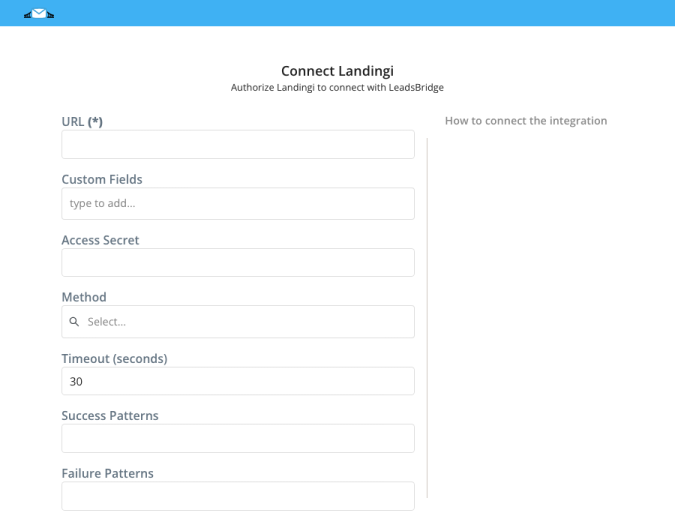

Step 2.B: Configuration details for Landingi
How to get URL, Access Secret
Landingi gives the possibility to send lead’s information to a Webhook URL, this is set up in the form settings. Create the bridge and select Landingi as Source. In the source step, you’ll see a URL address, set that endpoint as the data receiver inside your Landingi form settings.
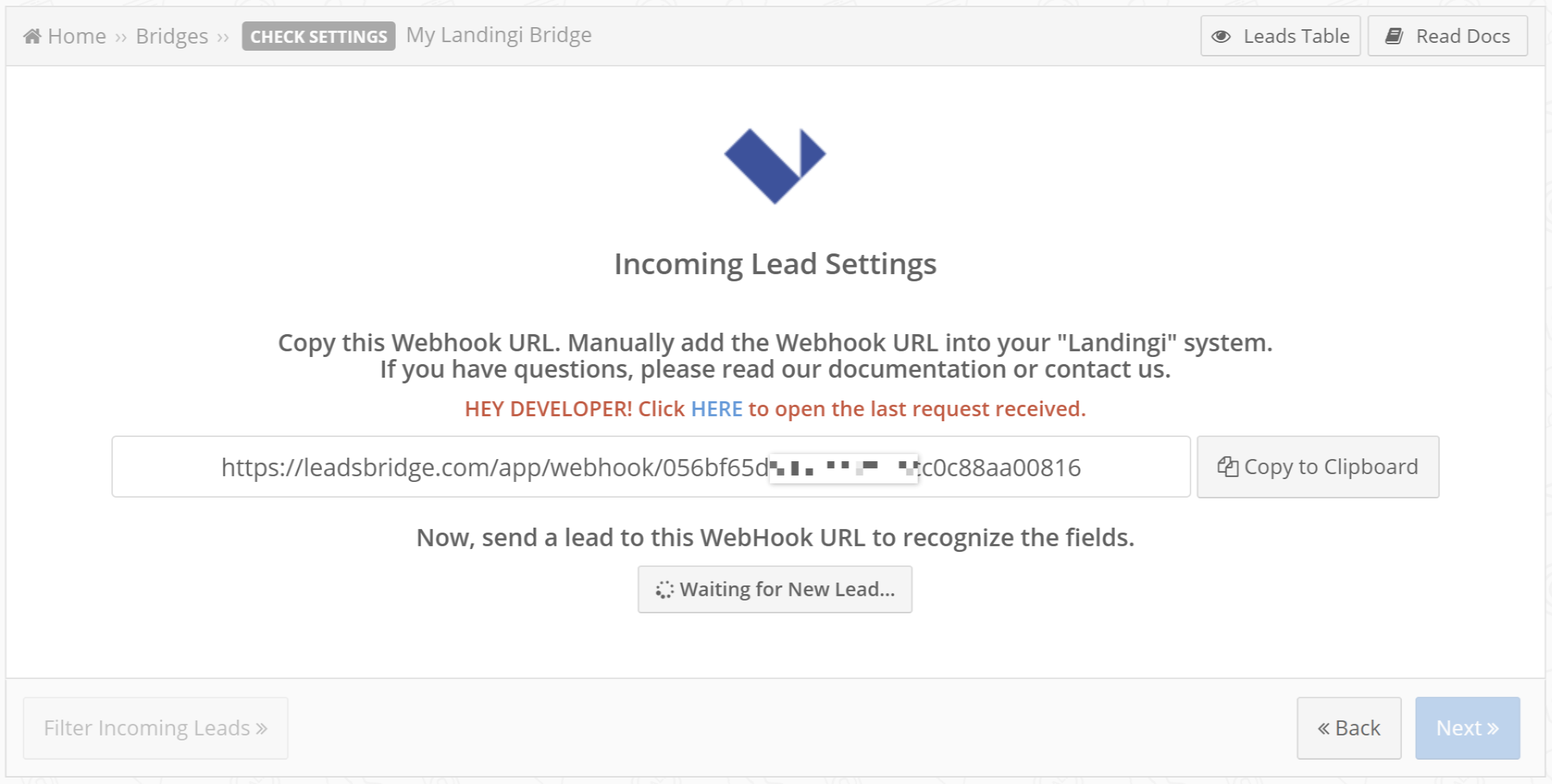

Set the Webhook with lead information in a form by following the steps below:
1. Log in to your account in the Landingi platform. Then go to editing the selected landing page.
2. In the editor, go to form settings. On the left, enter the Integrations and choose integration with Webhook.
3. In the Request URL field, paste the URL provided by LeadsBrdige during the Bridge creation.
4. In the Request method field, select POST.
5. Map the Landingi form fields with the fields that you would like to receive in LeadsBridge.
6. In the Request Headers fields, set the request headers that will be sent each time the form is sent. Remember that each heading consists of two parts: key and value, e.g. API_KEY: 1234-abcd-5678, where the first field concerns key and the second - value.
7. In the Request parameters fields you can set additional parameters that will be sent together with the form. Similarly to headers, it consists of two parts: key and value, which should be completed. For example, if we have a form with an email field and we set one parameter source:landingi, then each time someone sends this form, the query will send data to the API: email: marta@test.com (or what the user enters in the form) and source: Landingi. The request parameters perform almost the same function as the hidden fields in the form, but their advantage is that they are invisible from the page code.
For further information see: https://landingi.com/help/webhook-integration/
1. Log in to your account in the Landingi platform. Then go to editing the selected landing page.
2. In the editor, go to form settings. On the left, enter the Integrations and choose integration with Webhook.
3. In the Request URL field, paste the URL provided by LeadsBrdige during the Bridge creation.
4. In the Request method field, select POST.
5. Map the Landingi form fields with the fields that you would like to receive in LeadsBridge.
6. In the Request Headers fields, set the request headers that will be sent each time the form is sent. Remember that each heading consists of two parts: key and value, e.g. API_KEY: 1234-abcd-5678, where the first field concerns key and the second - value.
7. In the Request parameters fields you can set additional parameters that will be sent together with the form. Similarly to headers, it consists of two parts: key and value, which should be completed. For example, if we have a form with an email field and we set one parameter source:landingi, then each time someone sends this form, the query will send data to the API: email: marta@test.com (or what the user enters in the form) and source: Landingi. The request parameters perform almost the same function as the hidden fields in the form, but their advantage is that they are invisible from the page code.
For further information see: https://landingi.com/help/webhook-integration/
Step 2.C: Setup your Bitrix24 Webhook integration
- Click on Connect Bitrix24 Webhook
- Click on Create new integration to connect your Bitrix24 Webhook (or select an existing one from the dropdown if you already connected it)
- A popup wil be opened where you can authorize the Bitrix24 Webhook integration
- Fill Inbound Webhook URL field to connect Bitrix24 Webhook with LeadsBridge
- Click on the Authorize button
- You can choose a name for this Bitrix24 Webhook and LeadsBridge integration (you can also edit it later)
- Once done, click on Continue button and you will get back to the bridge experience where you could choose additional integration settings
- Now that your Bitrix24 Webhook is connected, you can continue with the set-up of your bridge
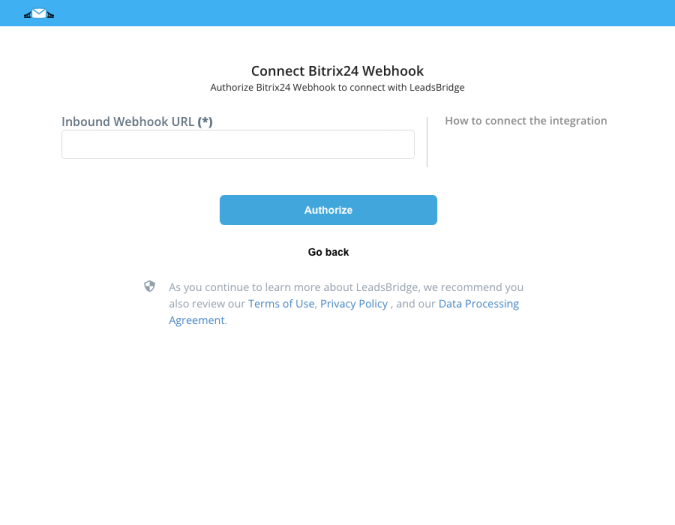

Step 2.D: Configuration details for Bitrix24 Webhook
How to get Inbound Webhook URL
In order to find the Inbound Webhook to connect Bitrix24 Webhook (as Destination) with LeadsBridge, follow the steps below:
- Log into your Bitrix24 account
- On the left menu go to More... » Developer Resources
- Click on Other » Inbound webhook on the top of the page
- Click on the pencil next to Inbound webhook and give your Webhook a name, for instance, LeadsBridge inbound webhook
- Make sure profile is selected under Request builder
- Under Assign permissions, click on + select
- Then, assign CRM and Users
- Click on SAVE
- Copy the URL under Webhook to call REST API
- Go back into LeadsBridge and paste the URL inside the Inbound Webhook URL field of your integration
- Finally, click on Finish or Continue with your Bridge configuration
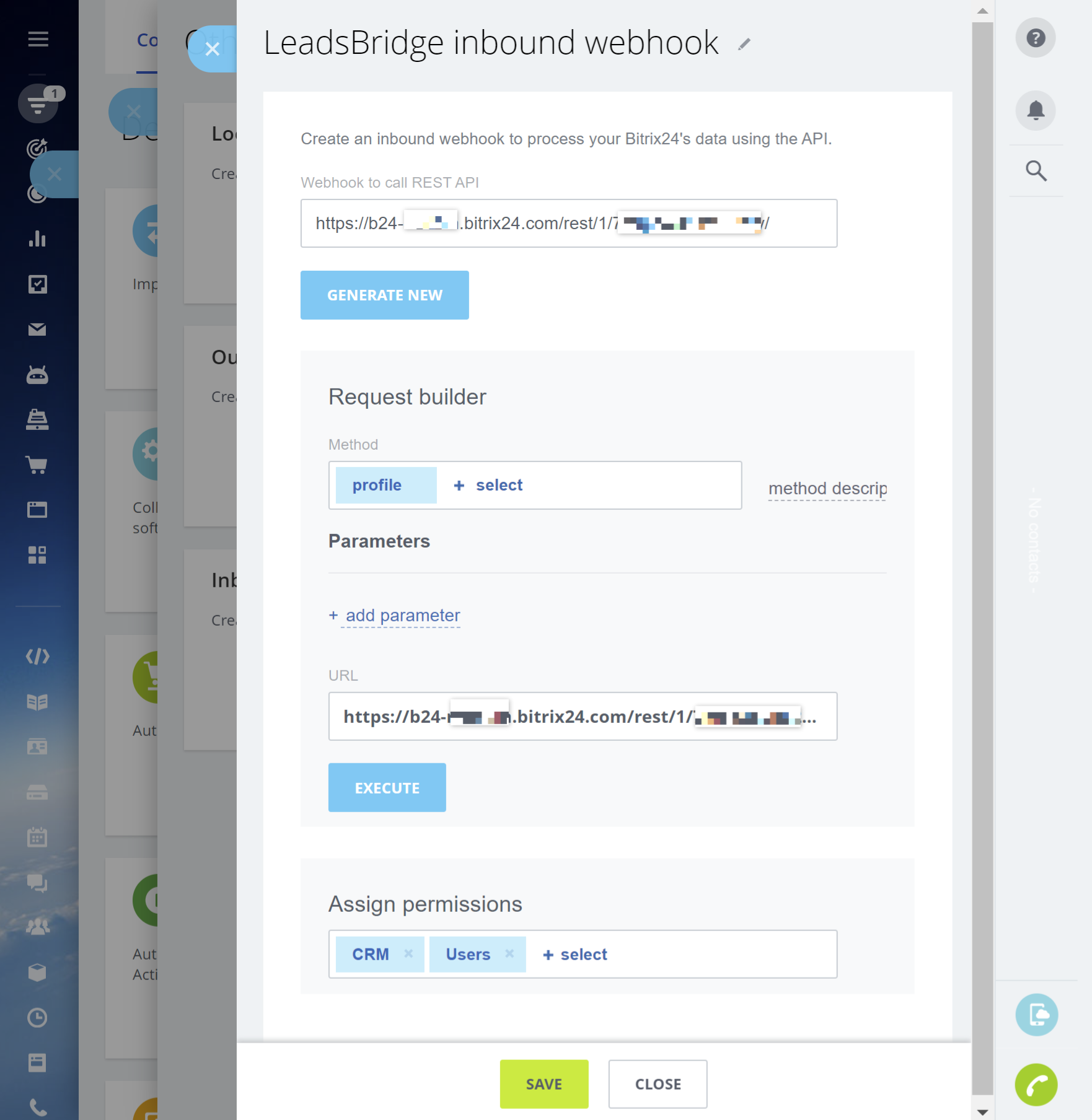

Step 2.E: Email Receipt (Optional)
You may choose to receive an email receipt for each incoming lead.
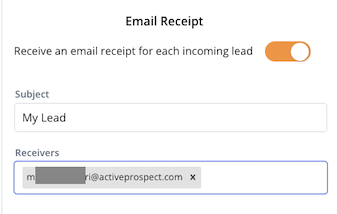

- Type the address(es) where you'd like to receive the receipt
- You may also modify the Subject line of the email
Step 3: Fields Mapping
Here you'll be able to map your Landingi information with your Bitrix24 Webhook fields.
- You will have Bitrix24 Webhook fields on the left. Match the information you wish to pass align from Landingi
- Based on Bitrix24 Webhook functionality, some fields might be required; if this is the case, you can identify those fields with a * (star), so be sure to map all them
- You can also use the functions to customize information like reformatting dates and times or modifying text, phone numbers and so on.
- You may leave blank the box of a field's information you don't want to send through. Clicking on the Show unmapped fields button you will have visibility on all the available fields still not mapped
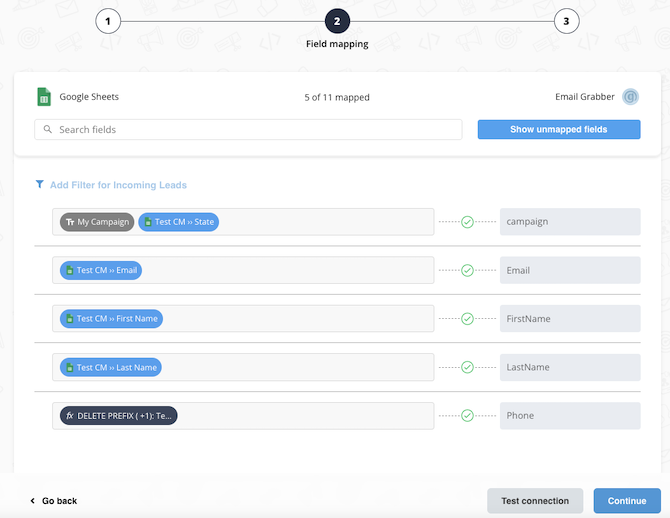

Step 3.A: Leads Filter (Optional)
If you'd like you could add a filter for incoming leads. This filter will sync only leads that meet the configured conditions
- Click on the link Add Filter for Incoming Leads on the top left
- A popup wil be opened where you can configure the filter
- You can define a series of condition to filter the leads. The lead will be synced only when all the conditions will be met
- Once finished, click the Save Changes button to switch back to the Fields Mapping to continue with the bridge configuration
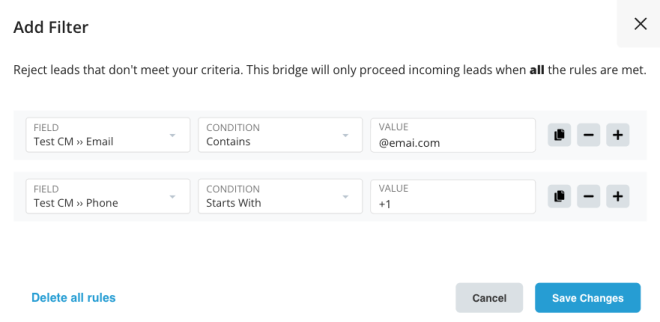

Step 4: Save and Publish
- Click on the Save and publish button
Congratulations! Now your bridge is up and running
Do you need help?
Here some additional resources:
- Landingi documentation page and common questions
- Bitrix24 Webhook documentation page and common questions
- LeadsBridge KNOWLEDGE BASE
- Contact support from your account clicking on the top right Support button






